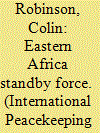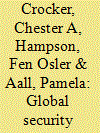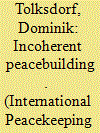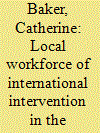| Srl | Item |
| 1 |
ID:
131101


|
|
|
|
|
| Publication |
2014.
|
| Summary/Abstract |
The Eastern Africa Standby Force is one of the five planned regional forces of the African Standby Force (ASF). Since February 2004 work has been underway to raise an Eastern Africa brigade to operational status. However, Eastern African states may prefer to solve their security problems in a unilateral military fashion, rather than through the integrated model of the ASF. Resources, as always in Sub-Saharan Africa, are scarce, operational capability appears to be growing only slowly, and significant training and airlift problems are unsolved. As these problems are common to all five brigades, some thoughts are presented in the conclusion to provide a simplified ASF way forward.
|
|
|
|
|
|
|
|
|
|
|
|
|
|
|
|
| 2 |
ID:
131104


|
|
|
|
|
| Publication |
2014.
|
| Summary/Abstract |
Since 2003 the EU has launched 16 peacekeeping missions in Africa in most cases in cooperation with the UN. Therefore, this article takes an inter-organizational perspective on the EU's peacekeeping activities in Africa. Theoretically the article makes a contribution to the growing literature on inter-organizational approaches by applying niche selection and resource exchange theory to the field of security studies. The paper finds that EU missions in the past followed a targeted and niche approach in which it has played a facilitating but not dominating role in UN peacekeeping operations. However, in order to make effective use of this targeted approach the EU and UN are currently engaging in a substantial reconstruction of their relationship by building an interlocking peacekeeping architecture in which elements of resource pooling are central.
|
|
|
|
|
|
|
|
|
|
|
|
|
|
|
|
| 3 |
ID:
131100


|
|
|
|
|
| Publication |
2014.
|
| Summary/Abstract |
At a time when the United Nations and key powerful states are pulling back from robust engagement in conflict management, regional organizations and ad hoc groupings of diverse organizations - collective conflict management initiatives - are stepping into the vacuum. In order to understand these two approaches - and why and when they may be operating together - this article compares them as they affect three significant questions and challenges in contemporary conflict management: is an intervention legitimate, is it effective, and does it set precedents for the community of states and international organizations that might be inclined to act. It notes that these approaches bring different strengths to an intervention process. Regional organizations play an increasingly critical role in providing legitimacy for an intervention, while the fact that collective conflict management initiatives do not set a precedent for further engagement allows them to act with more flexibility. The article concludes that neither of these approaches is sufficient to create a successor security regime to the post-cold war international system. It suggests that global power diffusion will be constrained by the irreplaceable core security competencies of powerful states acting bilaterally or, when it suits them, through regional bodies or the UN Security Council.
|
|
|
|
|
|
|
|
|
|
|
|
|
|
|
|
| 4 |
ID:
131103


|
|
|
|
|
| Publication |
2014.
|
| Summary/Abstract |
Between 2002 and 2008, the European Union simultaneously applied interventionism and the promotion of local ownership as policy approaches in its peacebuilding efforts in Bosnia and Herzegovina. This article introduces an analytical framework to evaluate the coherence of the EU's policies and applies this framework to two case studies involving the police sector: the EU's support to the fight against organized crime and to negotiations on a police reform. The article concludes that the two policy approaches applied by the EU were incoherent and that this incoherence contributed to the failure to achieve police restructuring in Bosnia.
|
|
|
|
|
|
|
|
|
|
|
|
|
|
|
|
| 5 |
ID:
131105


|
|
|
|
|
| Publication |
2014.
|
| Summary/Abstract |
The international organizations involved in peacebuilding, democratization and peacekeeping in the Yugoslav successor states have employed thousands of locally recruited workers as project officers, language intermediaries and support staff. This makes them a distinct employment sector within these post-socialist and in several cases post-conflict economies, most significantly in Bosnia-Herzegovina and Kosovo. This paper evaluates arguments in favour of regarding this workforce firstly as a group of workers suffering precarity and secondly as a privileged social elite. While there are good grounds for recognizing them as a distinctive social group, this distinctiveness has not led to a widely expressed social identity based on the commonalities of their employment.
|
|
|
|
|
|
|
|
|
|
|
|
|
|
|
|
| 6 |
ID:
131102


|
|
|
|
|
| Publication |
2014.
|
| Summary/Abstract |
The increasing privatization of military and stability operations has received considerable scholarly attention. Existing scholarship, however, has largely focused on the privatization of state foreign policy, overlooking the empirical analysis of international organizations' use of commercial actors in the conduct of crisis management operations. The present study fills this gap by investigating the role of commercial contractors in supporting European Common Security and Defence civilian and military missions. By doing so, the article intends to advance the empirical knowledge of the privatization of foreign policy activities and the scope, determinants and future prospects of EU reliance on commercial actors for CSDP crisis management operations.
|
|
|
|
|
|
|
|
|
|
|
|
|
|
|
|